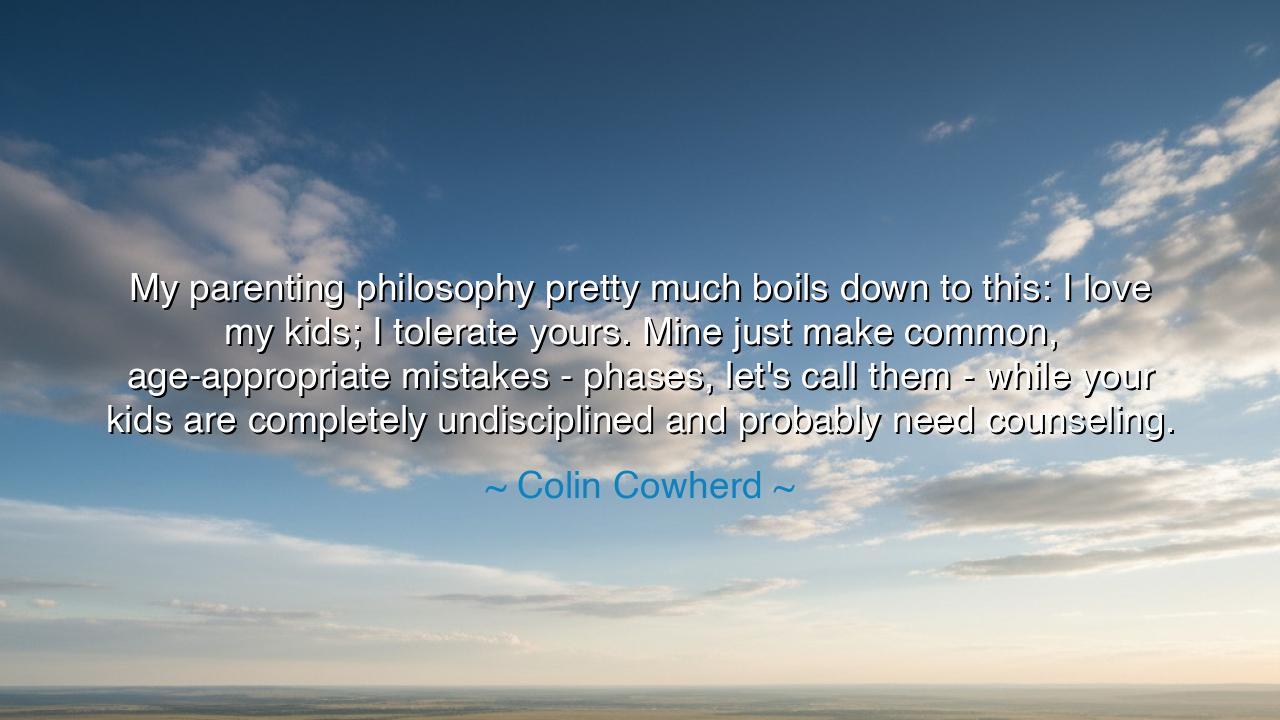
My parenting philosophy pretty much boils down to this: I love
My parenting philosophy pretty much boils down to this: I love my kids; I tolerate yours. Mine just make common, age-appropriate mistakes - phases, let's call them - while your kids are completely undisciplined and probably need counseling.






Colin Cowherd, with his sharp wit and sometimes biting humor, once declared: “My parenting philosophy pretty much boils down to this: I love my kids; I tolerate yours. Mine just make common, age-appropriate mistakes—phases, let’s call them—while your kids are completely undisciplined and probably need counseling.” Beneath the humor and exaggeration of his words lies a profound observation about the human tendency to view our own families with mercy, while judging the families of others with severity. It is a mirror held up to our biases, our protective instincts, and the pride we carry in our own children, even when they falter.
The first truth in this saying is that love softens judgment. When we look upon our own children, we see their mistakes through the eyes of compassion. A tantrum is not rebellion, but a phase. A lie is not corruption, but an experiment with truth. Yet when another’s child acts the same, our vision hardens; we see disrespect, negligence, or even corruption of spirit. Cowherd’s humor exposes the double standard of the parental heart—quick to forgive within, quick to condemn without.
History, too, testifies to this dynamic. The great Roman philosopher Seneca wrote often about the hypocrisy of men who excuse in themselves what they punish in others. A father may laugh when his child stumbles clumsily, yet shake his head in disdain when another’s child does the same. Seneca urged self-examination, warning that harsh judgment of others reveals not truth but pride. Likewise, Cowherd’s quip reminds us that true wisdom in parenting lies not in defending our own while disparaging others, but in learning to extend the same patience and understanding universally.
The parenting philosophy revealed here is not simply about children, but about the lens through which we view the world. Each parent is biased toward their own, for love creates a shield around them. But unchecked, this shield can blind us to the struggles of others. The parent who excuses their own child’s tantrum as fatigue may sneer at another child’s tantrum as a failure of discipline. In doing so, we not only wound other families, but we also blind ourselves to the universality of childhood’s trials.
Yet there is wisdom to be gained from this confession. If we recognize that all children stumble, then we may learn to temper our judgments and cultivate humility. The neighbor’s child, too, is undergoing phases. The unruly student in class may be wrestling unseen burdens. By granting to others the same mercy we extend to our own, we not only build compassion, we also forge stronger communities where parents support each other rather than stand divided in silent comparison.
A story from the life of Abraham Lincoln illustrates this point. Once, he was criticized for showing kindness to his enemies, rather than punishing them. His reply was simple: “Do I not destroy my enemies when I make them my friends?” So it is with parents: do we not heal the divisions of judgment when we replace them with empathy? By looking at another’s child and saying, “They too are learning, as mine are,” we turn judgment into solidarity, and competition into fellowship.
The lesson is thus clear: beware of partiality. Love your own children fiercely, but let that same love teach you mercy toward others. Do not be quick to condemn the struggles of another household, for you do not see the battles fought within their walls. Instead, cultivate a spirit of shared humanity, where the flaws of children are understood as part of the great unfolding of growth. And in this way, we not only raise our own children with love, but also create a world that welcomes every child with dignity.
Colin Cowherd’s words, though jesting, awaken a deeper truth: that parenting is not just about raising one’s own child, but about shaping the spirit with which we see all children. If we learn to extend our compassion beyond the walls of our homes, we leave behind not only wise sons and daughters, but also a kinder and more patient world.






AAdministratorAdministrator
Welcome, honored guests. Please leave a comment, we will respond soon